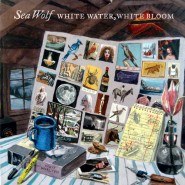 Sea Wolf
Sea WolfWhite Water, White Bloom
Score: 66
Sea Wolf, an indie-rock group from Los Angeles, was founded by Alex Brown Church, the founder of indie group Irving. The band has become gradually better known since their 2007 album “Leaves in the River,” two tracks of which have appeared in advertisements. Sea Wolf relies on a careful mix of folk and rock aesthetics, using Church’s distinctive vocals to combine the two. While their newest album, White Water, White Bloom, is interesting in some ways and certainly displays musical talent on the part of Sea Wolf, has flaws which prevent it from being outstanding.
White Water, White Bloom contains above-average instrumentals. Unfortunately, the instrumentals are not terribly far above the average. While “Wicked Blood” opens the album with a slightly shrill sound that remains very simple despite a large orchestration, eventually leading to over-repetition, other tracks including “Turn the Dirt Over” use large numbers of instruments to great effect, creating interesting, unique sounds that weave in and out through one another. Unfortunately, many of the songs on White Water, White Bloom lie somewhere near the average of these examples, with perfectly decent but absolutely unexceptional lines.
Church’s folkish vocals fill the expanse created by Sea Wolf’s music, adeptly telling the epic tales and reminiscences of White Water, White Bloom. In the more folk-centered parts of the album, Church’s voice is deep and substantial in a way that provides the music with a resonant melody while simultaneously directing its path. However, on more energetic tracks like “O Maria!,” Church’s voice ends up seeming somewhat over-extended, having left its low-key comfort zone far behind. Much of the album stays between the two points, leaving Church’s voice to gravitate between its strongest point on “Wicked Blood” and overextension.
As both vocals and instrumentals constantly swing from below average to excellent to mediocre and back, one can hardly be surprised to find a very mixed set of transitions. On one end of the spectrum, the first three tracks of the album seem so disconnected they could well have been from different albums. Transitions do improve from there, not only between tracks (the quiet end to “O Maria!” quite successfully allows its successor, “White Water, White Bloom” to join “O Maria!” as one of the most energetic tracks), but between sections of tracks. The best example is, again, “O Maria!,” which contains contrasting sections that manage to flow well into each other and retain connections through continuation of at least one line.
Sea Wolf’s lyrics, full of vivid metaphor and description, focus on stories and images told in Church’s reminiscent tone. From short lines which evoke beautifully detailed mental images, like “the dew in the grass had an electric glow,” to longer stories told in song, such as “Turn the Dirt Over“ ‘s “You left your brother in a northern town / The ferry o’er the water on the bay / His body covered by the colors going down / Statue in the square before the wind could change.” Lyrically, Sea Wolf cultivates a sort of strangeness which pervades their music, leading to a sense of surrealism throughout. Occasional repetition has the regrettable effect of weakening the lyrical impact, but in general, White Water, White Bloom is certainly a lyrically interesting album.
With White Water, White Bloom, Sea Wolf has managed an incredibly mixed album. Not only do the instrumentals and vocals vary wildly throughout the album, but they range wildly and independently, leaving the overall sound all the more mixed. In short, the closest thing to consistent on White Water, White Bloom is the lyrics, which, thankfully, are quite strong. In part because of the lyrics, but also because of an overall tendency towards creativity, the album does manage to keep itself solidly above average.